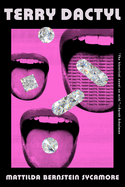
Through the AIDS crisis and Covid-19 pandemic, Terry Dactyl, the eponymous transgender protagonist of Mattilda Bernstein Sycamore's searing excursion into love, loss, friendship, family, and identity, grapples with and survives one personal and social crisis after another.
The harrowing künstlerroman follows asthmatic Terry from early life, raised by two free-spirited lesbian mothers on Seattle's Capitol Hill, to a successful career in New York City's drug-addled club and stressful art worlds and back to Seattle in middle age. Against all odds, Terry fashions a formidably resilient life.
After only one semester at Columbia University with her singular sense of style and a roommate teaching her to "pour coke into the bowl when [they] smoked pot," she creates a new family amid a gaggle of club-hopping kids. One of them, Sid Sidereal, becomes her soul mate. Then "one fateful night in 1997" Terry's life changes: on two hits of ecstasy, with her body painted magenta, in an '80s Goodwill prom dress with wings of trash, she is hired by gallerist Sabine Roth as an administrative assistant. There, Terry curates an art show that she names Club Kid Diaspora, which catapults her into a heady cultural stratosphere cut short by Sid's death. Later, Covid-19 lockdown sends her back to Seattle, where she reinvents herself in the old neighborhood, and her mothers turn their garage into a "little Costa Rica." She joins Black Lives Matter protests and bangs pots and pans at 8 p.m. with neighbors. Like her character, Sycamore (The Freezer Door) finds that she can allay loneliness through expression and art, sharing in "collective joy, collective rage, collective struggle." --Robert Allen Papinchak, freelance book critic

